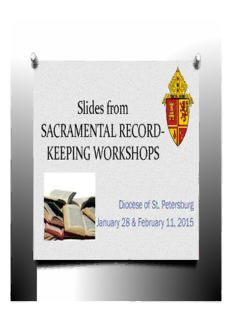
Sacramental Record Keeping 2015 PDF
Preview Sacramental Record Keeping 2015
Slides from SACRAMENTAL RECORD‐ KEEPING WORKSHOPS Diocese of St. Petersburg January 28 & February 11, 2015 Prayer Almighty God, by your grace alone we are accepted and called to your service. Strengthen us by your Holy Spirit and make us worthy of our calling to serve you through your Church. We ask this through Jesus Christ our Lord, who is alive and reigns with you and the Holy Spirit, one God, now and for ever. Amen. Sacraments and their Registers Overview: Sacramental Records Sacramental Records are the footprints of our O sacramental journey with Christ. They trace the powerful presence of God’s grace in our lives as individuals and communities. The Christian faithful have the right to expect O accurate, well-preserved sacramental records. Thus all those who have responsibility for creating and maintaining sacramental records, especially the pastors of parishes, should exercise great care in fulfilling their responsibilities. Most Reverend Daniel E. Pilarczyk Archbishop Emeritus, Archdiocese of Cincinnati Canon Law Regarding Sacramental Registers Each Parish is to have Baptismal, Marriage and O Death Registers as well as other register books and others required by the Conference of Bishops or by the Diocesan Bishop The Pastor or his delegate is to ensure that these O registers are accurate. Code of Canon Law, can. 535, §1 Required Sacramental Registers Per Canon 535, §1 Baptisms O Confirmations O (per c. 895) Marriages O (Should also include Convalidations and Radical Sanations) Deaths/Funerals O Book of Catechumens O (per c. 788) Recommended Sacramental Registers First Communions O Sick Calls O Book of Elect O Receptions Into Full Communion O Confidentiality and Access to Registers The Sacramental registers belong to the individual O parish. They are maintained for the good of the Christian faithful and are both private and public: Private because they were created in circumstances O presumed to be private and confidential. Public in that they will stand in civil law as valid and O authentic evidence. However, they are not open to examination and O inspection by anyone for whatever reason. Parish Seal Each parish is to have its own seal. O Documents which are issued to certify the O canonical status of the Christian Faithful (e.g., marriage certificates) as well as all acts which can have juridic importance are to be signed by the pastor or his delegate and sealed with the parish seal . (cf. can. 535, §3) Electronic Reproductions of Records Sacramental records may be duplicated on O computers. However a complete hand-printed record O must be maintained in the registers, and the registers themselves are never to be destroyed or discarded. The registers are considered the only O authentic copy of sacramental records.
Description: